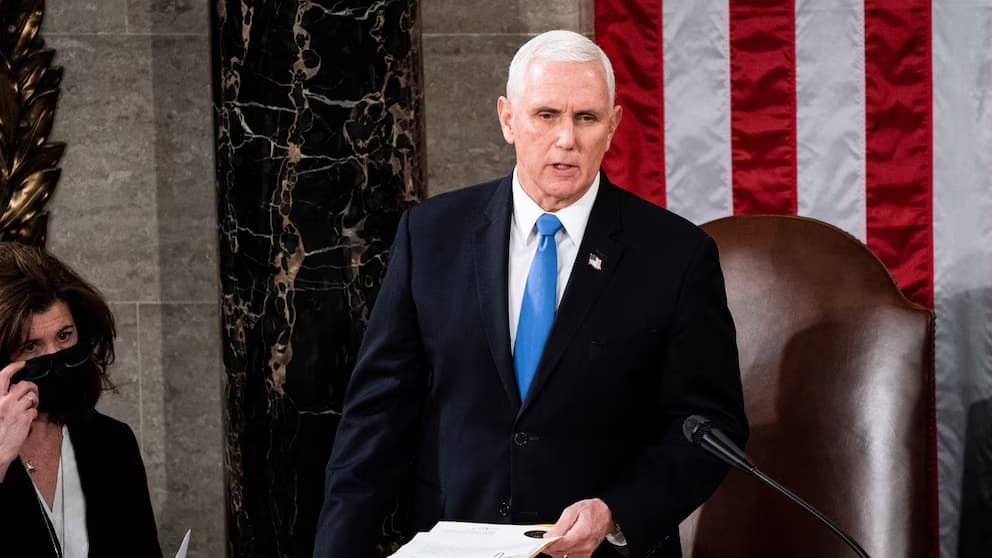We're loading the full news article for you. This includes the article content, images, author information, and related articles.
A new book, citing former Vice President Mike Pence's private notes, reveals the intense pressure campaign to overturn the 2020 U.S. election. The event serves as a global lesson on the fragility of democratic institutions and the constitutional duties of leaders.

On the morning of January 6, 2021, as a joint session of the U.S. Congress prepared to certify the results of the 2020 presidential election, then-President Donald Trump made a final, direct appeal to his Vice President, Mike Pence. In a tense phone call, Mr. Trump reportedly told Mr. Pence, "You'll go down as a wimp," if he refused to unilaterally reject the electoral votes. This revelation comes from a new book, "Retribution," by ABC News chief Washington correspondent Jonathan Karl, who gained access to Mr. Pence's previously unreleased, handwritten notes from that day.
The call, which took place just before Mr. Trump addressed supporters at a rally near the White House, represented the culmination of a weeks-long pressure campaign. According to the notes cited in the book, Mr. Trump also told his deputy, "If you do that, I made a big mistake five years ago." Mr. Pence's notes detail his response, in which he reminded the president that they had both taken an oath to support and defend the Constitution. "It doesn't take courage to break the law," Mr. Pence wrote that he told Mr. Trump. "It takes courage to uphold the law."
The events of that day, which escalated into a violent attack on the U.S. Capitol by a mob of Trump supporters, were not merely a political dispute but a fundamental challenge to the principle of the peaceful transfer of power. This principle is a cornerstone of stable, representative democracy, signifying that the will of the electorate is respected and that transitions between administrations are governed by law, not by force. The pressure on Mr. Pence was an attempt to subvert this process, based on unsubstantiated claims of widespread election fraud that had been widely dismissed by courts and election officials.
Hours after the phone call, rioters breached the Capitol, some chanting "Hang Mike Pence!" after Mr. Trump publicly singled him out for lacking the "courage" to act. Mr. Pence and his family were evacuated from the Senate floor to a secure location as the insurrection unfolded. The attack resulted in multiple deaths and injuries and delayed the certification of President-elect Joe Biden's victory for several hours.
The storming of the Capitol sent shockwaves across the globe, prompting widespread condemnation from world leaders, many of whom described it as an "assault on democracy." German Chancellor Angela Merkel stated she was "furious and saddened," linking the violence to the creation of an atmosphere where the election outcome was persistently questioned. Canadian Prime Minister Justin Trudeau directly blamed Mr. Trump for inciting the mob. These international reactions underscored the damage to the global perception of American democracy and highlighted the universal importance of upholding democratic processes.
For Kenya and other emerging democracies, the events of January 6 offer a profound cautionary tale. They demonstrate that even in a nation with long-established democratic traditions, institutions can be tested and norms can be threatened. The episode highlights the critical importance of several key principles highly relevant to the Kenyan context: the independence of state institutions, the unwavering adherence to constitutional oaths by public officials, and the collective responsibility of political leaders to respect electoral outcomes. The peaceful transfer of power is a concept that resonates deeply within Kenya's own political journey and remains a fundamental tenet for ensuring national stability and progress.
The revelations from Mr. Karl's book, based on Mr. Pence's own contemporaneous records, provide a stark, insider's account of a moment when democratic principles were pushed to the brink. They serve as a historical record of the personal and constitutional courage required to withstand political pressure at the highest levels, a lesson that transcends borders and holds significance for citizens and leaders in every democratic nation.
Keep the conversation in one place—threads here stay linked to the story and in the forums.
Sign in to start a discussion
Start a conversation about this story and keep it linked here.
Other hot threads
E-sports and Gaming Community in Kenya
Active 9 months ago
The Role of Technology in Modern Agriculture (AgriTech)
Active 9 months ago
Popular Recreational Activities Across Counties
Active 9 months ago
Investing in Youth Sports Development Programs
Active 9 months ago